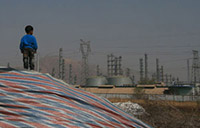Transitioning China needs tougher environmental law
Updated: 2014-04-25 10:38
(Xinhua)
|
||||||||
BEIJING -- Revisions to the Environmental Protection Law adopted by senior Chinese legislators could not have come at a better time.
The Standing Committee of China's National People's Congress (NPC) on Thursday approved the most sweeping revisions
 |
| Poisonous mine turns village into cancer community |
 |
| Turning waste into something valuable |
 |
| Lanzhou villagers forced to move due to pollution |
After two years of heated debate, the much-anticipated revision expanded the law to 70 articles from 47 in the previous version, enshrined environmental protection as the government's overriding priority, and included specific articles and provisions on tackling smog.
For a country mired in pollution amid mounting public anger over a deteriorating environment, strict implementation of the new law is more relevant than ever.
Before this week's NPC Standing Committee session, China's Environmental Protection Law had not been revised since it took effect in 1989.
Decades of rapid economic growth have taken their toll on the country's ecology, while disturbingly lenient penalties have indulged excessive environmental pollution.
A report issued in April showed that nearly 60 percent of monitored areas in China had "very poor" or "relatively poor" underground water quality last year.
Another report issued jointly by the Ministry of Environmental Protection and the Ministry of Land and Resources on April 17 showed that about 16.1 percent of the country's soil is polluted.
Heavy smog that has frequently shrouded Beijing, Shanghai and other major Chinese cities is a more obvious cause for concern. And on April 11, more than 2.4 million people in Lanzhou of northwest China's Gansu Province, were affected by tap water that contained excessive levels of benzene.
The madness has to stop.
Pollution has been on the top of the Chinese government's agenda for years, but problems have persisted.

 China calls on talent worldwide
China calls on talent worldwide
 Celebrated sculptor seeks to establish art museum
Celebrated sculptor seeks to establish art museum
 Multilateral drill marks navy's 65th birthday
Multilateral drill marks navy's 65th birthday
 MOCA to open Chinese ink show
MOCA to open Chinese ink show
 US sends troops to Poland for exercises
US sends troops to Poland for exercises
 French 'spiderman' scales 33-story building in Macao
French 'spiderman' scales 33-story building in Macao
 2014 China Graduate Fashion Week in Beijing
2014 China Graduate Fashion Week in Beijing
 Top 10 celebrities driving auto brands
Top 10 celebrities driving auto brands
Most Viewed
Editor's Picks

|

|

|

|

|

|
Today's Top News
A window into China's big dilemmas
Celebrated sculptor seeks to establish art museum
China calls on talent worldwide
Infrastructure opening to foreign investors
Supreme Court ruling mixed news for SCA-5
Top Chinese legislator meets U.S. House majority leader
Obama criticized for Diaoyu Islands remarks
Opinion: Asia's future at risk
US Weekly

|

|







